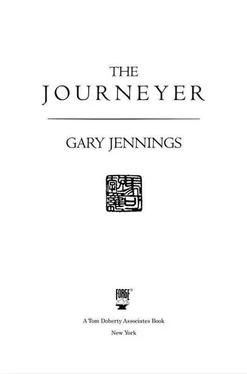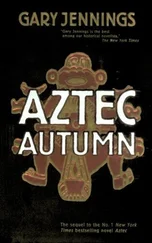We also soon discovered that Jawa had no Paradise climate, for we had no sooner got ashore than we were drenched by a thunderstorm. Rain falls on that island one day of every three, we were told, and usually in the form of a thunderstorm which, we did not have to be told, was a fair imitation of the end of the world. I trust that, after our eventual departure, Jawa enjoyed an uncommonly long spell of fine weather, because we had nothing but bad. That first storm simply continued, day and night, for weeks, the thunder and lightning taking a rest now and then, but the rain falling interminably, and we rode it out there at anchor in the river mouth.
Our captains had intended to go west from this place through the narrow passage called the Sunda Strait, which separates Jawa the Greater from the next westward island, Jawa the Lesser, also called Sumatera. They said that strait allowed the easiest run to India, but they also said the strait could only be negotiated in calm seas and unimpeded visibility. So our fleet stayed in the Jakarta River mouth, where the downpour was so continuous and so heavy that Jawa was not even visible through it. But we knew the island was still there, because we were waked at every dawn by the howling and whistling of the gibbon apes in the jungle treetops. It was not really an uncomfortable place to be marooned—our boatmen brought from shore fresh pork and fowl and fruits and vegetables to augment our stores of smoked and salted foods, and we had a plenitude of spices to enhance our meals—but the waiting got extremely tiresome.
Whenever I got insupportably weary of seeing nothing but the harbor water jumping up to meet the rain, I would go ashore, but the view there was not much better. The Jawa people were quite comely of appearance—small and neatly proportioned and of golden skin, and the women as well as the men went bare to the waist—but the entire populace of Jawa, whatever religion it had originally espoused, had long ago been converted to Hinduism by the Indians who were the chief spice buyers. Inevitably, the Jawa people had adopted everything else that seems to go with the Hindu religion, meaning squalor and torpor and reprehensible personal habits. So I found the people no more appealing than any other Hindus, and Jawa no more appealing than India.
Some of the others of our company tried to alleviate their boredom in other ways, and came to grief by it. All the Han crewmen of our fleet, like mariners of every race and nationality, were mortally terrified of getting into water. But the Jawa people were quite at home on it and in it as well. A Jawa fisherman would skim about on even a turbulent sea in a craft called a prau, so small and flimsy that it would have been careened by the waves except that it was balanced by a log carried at some distance alongside on long cane spars. And even the Jawa women and children swam considerable distances from the shore through quite fearsome surf. So a number of our Mongol male passengers, and a few venturesome females, all of them inland-born and therefore incautious about large bodies of water, decided to emulate the Jawa folk and frolic in that warm sea.
Though the ambient air, full of the downpouring rain, was almost as liquid as the sea, the Mongols stripped down to a minimum of clothing and slid overboard to splash about. As long as they held onto the many rope ladders dangling overside, they were in no great danger. But many got overdaring, and tried swimming at liberty, and of every ten of them who vanished beyond the curtain of rain, perhaps seven would reappear. We never knew what happened to the missing ones, but the attrition kept on. It did not frighten others from venturing out, and we must have lost at least twenty men and two women from Kukachin’s retinue.
We did know what happened to two of our casualties. One man who had been swimming climbed back onto the ship, cursing “Vakh!” to himself and shaking drops of blood from one hand. As the ship’s Han physician salved it and bound it up, the man reported that he had rested his hand on a rock, and a fish had been clinging to it, a fish mottled with algae and looking just like the rock, and its dorsal spines had stung him. He said that much, and then screamed, “Vakh! Vakh! Vakhvakhvakh!” and went into insane paroxysms, thrashing all about the deck, foaming at the mouth, and when he finally slumped in a heap, we found that he was dead.
A Jawa fisherman, who had just brought his catch to sell to us, regarded that performance without emotion, and then said—a Han crewman translating—“The man must have touched a stonefish. It is the most venomous creature in any sea. Touch it, you endure such terrible agony that you go mad before you die. If that happens to anyone else, split a ripe durian and apply it to his wound. It is the only remedy.”
I knew that the durian had many praiseworthy qualities—I had been voraciously eating of them ever since I discovered that they grew in profusion here—but I would never have suspected that the fruit had medicinal qualities. However, soon afterward, one of Kukachin’s hairdressing women also went for a swim, and came back weeping from the pain of a spine-stung arm, and the physician tried the durian remedy. To everyone’s pleased surprise, it worked. The girl suffered no more than a swollen and painful arm. The physician made a careful note for his collection of materia medica, saying in some amazement, “As nearly as I can judge, the durian pulp somehow digests the stonefish poison before it can take dire effect.”
And we also saw what accounted for the loss of another two of our company. The rain had finally stopped, and the sun had come out, and our captains were all standing on their decks, scrutinizing the sky and waiting to see if the weather might continue fine, long enough for us to up anchor and be away, and they were muttering Han incantations to make it so. The jade-green Jawa Sea that day looked so pretty as almost to tempt me into it—a gentle chop, fish-scaled with glittering lunettes of light—and did tempt two other men, Koja and Apushka, two of the three envoys of the Ilkhan Arghun. They challenged each other to a water race to a distant reef, and plunged from the chuan’s side and went flailing and splashing away, and we all gathered at the rail to cheer them on.
Then down from the sky swooped a number of albatrosses. The birds, I suppose, had been balked in their usual fishing by the long spell of rain, and were weary of scavenging our ships’ garbage and wanted some fresh meat. They began making dives at the two swimmers, stabbing their long hooked beaks at whatever parts of the men showed above the water, which was their heads. Koja and Apushka stopped swimming, trying to fend off the clustering birds and stay above water at the same time. We could hear them shouting, then cursing, then screaming, and see the blood running down their faces. And, when the albatrosses had plucked the eyes out of both of them, the men in desperation sank under water. They tried to rise up for a gasp of air a time or two, but the birds were waiting. And finally the two men simply let themselves drown, in preference to being torn to pieces. But, of course, as soon as their bodies floated limply and soggily on the surface, the albatrosses settled on them and peeled and shredded them for all the rest of that day.
It was sad, that Apushka and Koja had come safely through the countless hazards of journeying overland from Persia to Kithai, and then the long sea way to here, to die so abruptly and in such an un-Mongol-like way. We were all, Kukachin especially, much grieved by the loss. We did not think to take it as a premonition of any future and perhaps more grievous loss—my father did not even murmur about “bad things always happening in threes”—though, as events turned out, we might well have seen an omen in it.
Читать дальше












